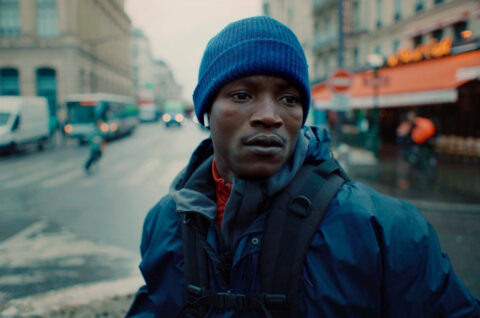If The Story of Souleymane (Boris Lojkine, 2024) stresses anything, it’s that you should tip your delivery drivers. In cash. Not only do they make minuscule, labour-abusive wages, they might not even be registered in their own name. Some cash, however little, can mean the difference between a hostel that evening or a night in the streets; a hot meal or going it alone on an empty stomach.
For Guinean migrant Souleymane (Abou Sangare in a star-making debut), couriering under another man’s name for an exploitative cut, his thankless “job” is a matter of life and death, desperately needing those wages to pay off a black market dealer to forge his refugee papers.
Wheeling from restaurant to restaurant, apartment to apartment, dodging traffic and the police while fighting off the algorithmic whims of his faceless employer and a sense of chronic fatigue, The Story of Souleymane immerses us into the travails of our eponymous hero; caught in limbo while waiting for his asylum interview.
There’s a Dardennesque feeling to the story, using its compressed chronology (a mere two days), slice-of-life characters and handheld frames to carry us alongside Souleymane and his seemingly insurmountable quest.
Perhaps it would be easier if he would just tell the truth. In what feels like the European-set sequel to Matteo Garrone’s Io capitano (2023) — right down to the details of torture and extortion in Libyan prisons — Souleymane doesn’t have an easily digestible narrative of fleeing genocide or political crackdowns in his home country. Instead, like many migrants to Europe, he simply wants to make a better life for himself and his family. Yet, instead of demonising him for his ambitions, as the right-wing press is wont to do in its rank distinctions between good and bad migrants, Lojkine easily displays Souleymane’s story as one worth telling.
What gives The Story of Souleymane its immense groundswell of feeling isn’t its constant hardship, but the glimmers of humanity strewn throughout. Paris might be an unforgiving, brutal city, but it’s not without its small heroes, from an Asian restaurant lady giving him a sweet to the men offering free coffee and tea by the train station at god-knows-o’clock-in-the-morning. These gestures, however small, give Souleymane that extra kick to keep going; to deliver one more order, to revise even harder for his interview, to get up in the morning and try and make It through.
With no score, the sound design — capturing the whirring of his bike, the chaos of Parisian traffic and the hubbub of restaurants — does the heavy lifting. The entire sound department (Samuel Aïchoun, Pierre Bariaud, Marc-Olivier Brullé, Charlotte Butrak) deserve a very special shout-out for transforming Souleymane’s troubles into a legible, often cacophonous, soundscape, while also knowing when to shut the noise out and let the silences speak for themselves.
It culminates in the claustrophobic interview itself, centred by Sangare’s stunning, revelatory physical performance, capturing great depths of emotion in a mere pause or a movement in the eyes. After all, no one travels half the length of Africa, risking death and torture, for a lark, or works as a delivery driver for a merciless app company for the hell of it; they do so out of desperation for a better life. The Story of Souleymane stresses the rare humanity forgotten in toxic questions of immigration.

Redmond is the editor-in-chief of Journey Into Cinema.




